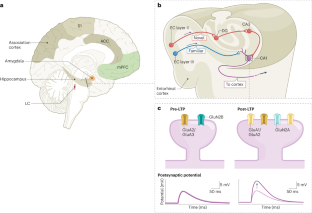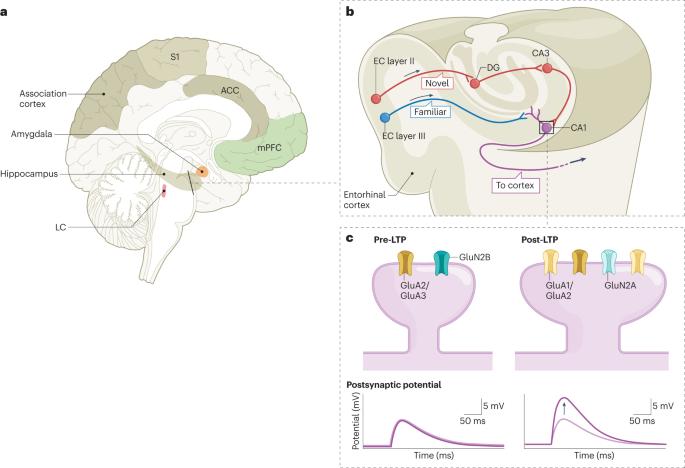隔夜神经元可塑性和对情绪困扰的适应性
IF 28.7
1区 医学
Q1 NEUROSCIENCES
引用次数: 0
摘要
睡一觉就好了 "等说法指的是通过一夜酣睡来解决痛苦经历。睡眠是一种活跃的状态,在此期间,大脑会重组形成记忆的突触连接。本视角提出了一个关于睡眠如何改变情绪记忆痕迹的模型。依赖睡眠的重组是通过神经化学环境中的神经生理事件发生的,这些事件决定了突触生长、存活或被修剪的命运。我们讨论了非快速眼动睡眠期间低水平的乙酰胆碱和快速眼动睡眠期间低水平的去甲肾上腺素如何为情感记忆神经元表征的可塑性提供了一个独特的机会之窗,从而解决相关的困扰。我们从三个层面整合了睡眠促进的适应:经验和行为、神经元回路和突触事件。该模型提出了一些可检验的假设,说明依赖睡眠对情绪困扰的适应失败如何成为精神障碍的关键,特别是焦虑症、抑郁症和创伤后应激障碍,其共同病因是失眠。本文章由计算机程序翻译,如有差异,请以英文原文为准。


Overnight neuronal plasticity and adaptation to emotional distress
Expressions such as ‘sleep on it’ refer to the resolution of distressing experiences across a night of sound sleep. Sleep is an active state during which the brain reorganizes the synaptic connections that form memories. This Perspective proposes a model of how sleep modifies emotional memory traces. Sleep-dependent reorganization occurs through neurophysiological events in neurochemical contexts that determine the fates of synapses to grow, to survive or to be pruned. We discuss how low levels of acetylcholine during non-rapid eye movement sleep and low levels of noradrenaline during rapid eye movement sleep provide a unique window of opportunity for plasticity in neuronal representations of emotional memories that resolves the associated distress. We integrate sleep-facilitated adaptation over three levels: experience and behaviour, neuronal circuits, and synaptic events. The model generates testable hypotheses for how failed sleep-dependent adaptation to emotional distress is key to mental disorders, notably disorders of anxiety, depression and post-traumatic stress with the common aetiology of insomnia. Sleep is an active state during which the synaptic connections that form memories are remodelled. In this Perspective, Wassing and colleagues discuss how failures in sleep-dependent adaptation to emotionally distressing experiences might be a key contributor to post-traumatic stress disorder and related conditions.
求助全文
通过发布文献求助,成功后即可免费获取论文全文。
去求助
来源期刊

Nature Reviews Neuroscience
NEUROSCIENCES-
自引率
0.60%
发文量
104
期刊介绍:
Nature Reviews Neuroscience is a multidisciplinary journal that covers various fields within neuroscience, aiming to offer a comprehensive understanding of the structure and function of the central nervous system. Advances in molecular, developmental, and cognitive neuroscience, facilitated by powerful experimental techniques and theoretical approaches, have made enduring neurobiological questions more accessible. Nature Reviews Neuroscience serves as a reliable and accessible resource, addressing the breadth and depth of modern neuroscience. It acts as an authoritative and engaging reference for scientists interested in all aspects of neuroscience.
 求助内容:
求助内容: 应助结果提醒方式:
应助结果提醒方式:


